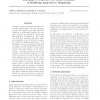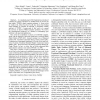183 search results - page 10 / 37 » Learning Social Preferences in Games |
118
click to vote
ATAL
2009
Springer
15 years 8 months ago
2009
Springer
We present a logic for reasoning about strategic games. The logic is a modal formalism, based on the Coalition Logic of Propositional Control, to which we add the notions of outco...
119
click to vote
ICML
2003
IEEE
16 years 2 months ago
2003
IEEE
Learning in many multi-agent settings is inherently repeated play. This calls into question the naive application of single play Nash equilibria in multi-agent learning and sugges...
115
click to vote
ECAI
2006
Springer
15 years 5 months ago
2006
Springer
We describe a generalized Q-learning type algorithm for reinforcement learning in competitive multi-agent games. We make the observation that in a competitive setting with adaptive...
EDM
2010
15 years 3 months ago
2010
Epistemic games are designed to help players develop domain-specific expertise that characterizes how professionals in a particular domain reason, communicate, and act [1, 11]. To ...
118
click to vote
FOCS
2009
IEEE
15 years 8 months ago
2009
IEEE
— In a landmark paper [32], Papadimitriou introduced a number of syntactic subclasses of TFNP based on proof styles that (unlike TFNP) admit complete problems. A recent series of...




